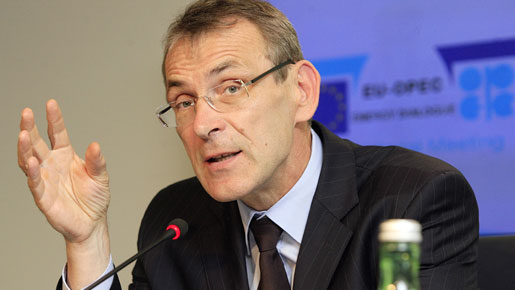
The EU is the world’s largest donor bloc, accounting for 56 percent of world aid, or 48 billion euros ($66bn) in 2007.
Member states have promised to spend 0.7 percent of their GNI on aid by 2015, but with public finances in disarray due to the financial crisis and budget spending tight, most are struggling to keep that pledge.
“If member states cannot keep to the soft-target guidance, then we will think of a binding scheme that would enforce the 0.7 percent target. We need to find the way,” Piebalgs said.
The OECD said in mid-April that development aid from the EU declined in 2009. The OECD survey found that EU states spent just about 0.42 percent of GNI on aid.
“Let us make credible action plans for each and every country on how they will try to achieve this target and give more power of surveillance to the European Commission and member states to do a thorough peer review,” said Piebalgs.
“It is politically important.”
Innovative financing
Piebalgs said he doubted EU member states would be able to meet their target and said he feared a meeting in New York in September, when new commitments will be made to the United Nations’ Millennium Development Goals, could turn into a “bashing of the EU” over failed promises.
The September 20-22 meeting of heads of state and government at the United Nations is expected to look at speedier ways of helping developing countries achieve the goal of fighting poverty, hunger and disease by 2015.
“For the credibility of the European Union and real effectiveness of the New York summit, we need to make big improvements on official development aid,” said Piebalgs.
Some European leaders have raised the idea of a tax on financial transactions, and Piebalgs said that could be used to raise funds for the bloc’s aid targets.
“Any source would be good. Morally we have the clause that backs this Financial Transaction Tax. I believe that a lot of countries are ready for this, and it is being discussed internationally too,” he said.
“If you want a serious European policy on development aid, it would be better to have a specific source of income. It gives more predictability to the whole policy.”
Piebalgs said one goal of his five-year mandate was to streamline the bureaucracy of EU development policy, cutting waste and overlap, and improving coordination among member states’ various development programmes.
As a first step, he said the EU’s executive would draw up a package of measures ahead of the New York summit.
“It consists of measures that we think are necessary, and focuses on the targets we believe should be emphasised such as food security, global health, gender issues, and strengthening the tax system of developing countries,” he said.

